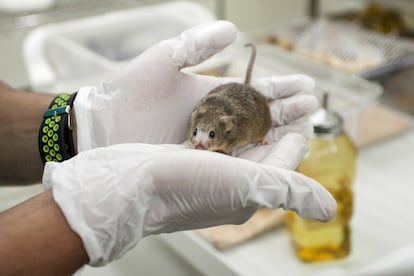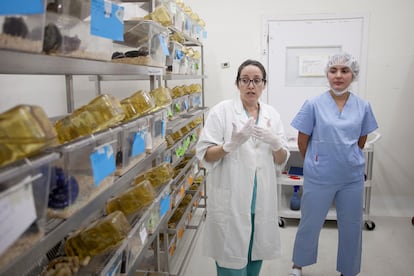Airlines block the transport of lab animals worldwide
The Canary Islands’ laboratories have spent a year without receiving a single mouse to study ailments like epilepsy or cancer. Scientists in the United States and Europe protest that the companies are “hurting public health” by blocking their research


The researcher Teresa Giráldez is tired of complaining about the same thing. “It’s unfair, we’re totally paralyzed by an arbitrary decision. I have two projects that are seriously affected, but in the long term it’s going to be a real problem,” protests the scientist from La Laguna University in Tenerife, one of Spain’s Canary Islands. Her problem: lab mice can’t fly to the Spanish archipelago, where around 40 investigations are endangered because of this decision. The refusal of airlines to carry experimental animals is blocking science in the Canary Islands: without these animals it’s impossible to study ailments like cancer or epilepsy, or to search for their cures. Iberia and Air Europa first implemented this refusal in 2016, which provoked interventions by the military and Congress to save projects on the edge of ruin. The ban experienced a resurgence in March 2021 in the Canary Islands, which have spent a year without receiving a single mouse. But it’s a global problem that has driven scientists to desperation in Europe and the US, where the ban is in litigation.
Airlines are suffering the pressure “of ultraprotective animal groups” because they don’t want to be criticized socially, explains Javier Guillén, the Europe and Latin America director of the Association for Assessment and Accreditation of Laboratory Animal Care International. “It doesn’t just affect the Canary Islands, it’s an international problem,” he laments. Guillén explains that big labs are able to charter planes for their shipments, but “there are sites where that’s not possible, the most affected are always the smallest groups…In the Canary Islands it all comes together, they have it really bad: the only option left is for politicians to pressure their flagship airlines to continue the shipments,” he asserts.
Spain’s Ministry of Science and Innovation, consulted by EL PAÍS, assures that “it’s crucial to guarantee the normal functioning of the scientific system in all territories” and that “to do that it’s necessary that chains of transport aren’t broken in the extreme periphery,” like the Canary Islands, which are located in the Atlantic Ocean, off the northwestern coast of Africa. “The ministry, as on other occasions, has been willing to intercede so the airlines will guarantee the supply chains that researchers in the Canary Islands rely upon,” confirms a spokesperson.

In 2016, the first time that research into diabetes and rare diseases was paralyzed in the Canary Islands, it got to the point where a military plane was used to get around the companies’ air embargo and send four boxes with some 30 mice dedicated to the study of rheumatoid arthritis. The Spanish Congress then approved a non-legislative proposal that urged the government to require the airlines to transport the lab animals, with the only vote against the measure from the conservative Popular Party (PP), which defended business freedom. Finally, Iberia lifted the ban. According to the airline group, this was done “exceptionally, to collaborate in finishing urgent projects.” But IAG Cargo, the group’s parent company for shipments, states that “IAG Cargo does not transport live animals for use in laboratories, experimentation or exploitation.”
For Kirk Leech, director of the European Animal Research Association, it’s a problem of public pressure. The majority of airlines have stopped transporting animals for use in research, “be that because of the fear of a general boycott of their services by the public or because of insidious activist campaigns…I think that the fear is exaggerated, given the public’s improved understanding of animal research, mice included, which was used to produce vaccines for Covid,” Leech confirms. Support for these experiments grew to 64% in this context in America. “With the issue of the Canary Islands, this appears to be an internal decision of the company not connected to a public campaign. The airline needs to understand the harm that this is causing to research and, ultimately, to public health,” he asserts.
Litigation in the US
Leech explains that only one commercial airline, Air France, is willing to transport primates for research in Europe or the US. These animals are used exceptionally in specific cases for the development of pharmaceuticals, like the vital Covid vaccines. What’s more, only a handful of commercial airlines transport smaller animals, like mice, rats, rabbits or even zebra fish, which are often used in neuroscience and which never make it to the Canary Islands.
In the US, the National Association for Biomedical Research in 2018 opened litigation against four airline companies (IAG, owner of Iberia, United, China Southern Airlines and Qatar Airways) for “illegal discrimination,” given that they transport mice, rats and dogs without issue…unless that mouse, rat or dog will be used to try and cure a disease. A few months ago, 90 American universities and scientific societies urged the Department of Transportation to take control of the matter.

Leech explains that the transport of lab animals “is an essential element of medical progress for scientists worldwide…Without the ability to move them, crucial scientific research that searches for new treatments will get stuck,” he warns. In the last few years, the use of animals in scientific experiments has plummeted thanks to new laws and greater awareness. But negative images such as the exploitation of animals to develop cosmetics, which has been prohibited for a decade, persist.
As for the mice that fly to the Canary Islands, they are animals that have been modified to have characteristics that will make the investigation more efficient, which reduces the number of animals used in the long term. “The government of the Canary Islands needs to speak with the airlines, and the scientific community needs to offer information and pressure the government,” Leech summarizes. In the Canary Islands, they don’t just want to receive model animals, they want to send them: take what happened to Giráldez when Stanford University scientists became interested in her work, but at the end of the day she couldn’t collaborate with them because of the ban.
That’s what Carlos Navarro, the director of the Canary Islands Research Agency, wants, although he admits that with the airlines he prefers diplomacy and discretion when faced with the media spotlight, after El Día leaked the news of the new ban. “We have spent a few years suffering from this problem. Iberia made an exception with the Canary Islands, but now they are obligating us to explore other alternative means to establish routes. We all want to have vaccines and remedies for our ailments,” he reasons. Right now, they are studying the use of small planes and the development of animals within La Laguna University.
“All of us who do research are very clear that in the future, we will have moved beyond using animals,” Giráldez admits. She receives money from the European Research Council and other institutions to finance her studies, which improve understanding of brain diseases. “We have very strict controls, but in this moment animals are crucial: we can only get to a certain point in cellular models. To cure diseases we need to reproduce them in a living being,” she explains.
For Guillén, “we are faced with the absurdity that the public money that’s been invested in the Canary Islands could be lost because we have no argument for how we are spending it well.” Giráldez agrees with him: “If the government supports research, as is currently the case, there must be institutional support beyond arbitrary private decisions. Research should be prioritized. Without these measures our capacity for scientific development will break down.”
Tu suscripción se está usando en otro dispositivo
¿Quieres añadir otro usuario a tu suscripción?
Si continúas leyendo en este dispositivo, no se podrá leer en el otro.
FlechaTu suscripción se está usando en otro dispositivo y solo puedes acceder a EL PAÍS desde un dispositivo a la vez.
Si quieres compartir tu cuenta, cambia tu suscripción a la modalidad Premium, así podrás añadir otro usuario. Cada uno accederá con su propia cuenta de email, lo que os permitirá personalizar vuestra experiencia en EL PAÍS.
¿Tienes una suscripción de empresa? Accede aquí para contratar más cuentas.
En el caso de no saber quién está usando tu cuenta, te recomendamos cambiar tu contraseña aquí.
Si decides continuar compartiendo tu cuenta, este mensaje se mostrará en tu dispositivo y en el de la otra persona que está usando tu cuenta de forma indefinida, afectando a tu experiencia de lectura. Puedes consultar aquí los términos y condiciones de la suscripción digital.








































